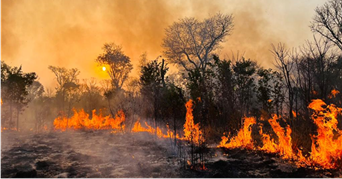Compiled by: Uazamo Kaura Head/Programme Specialist: UNDP Sustainable Environment Management, Energy and Resilience Building Portfolio
Fire Monitoring and Community Engagement: MEFT and UNDP's Collaborative Efforts
May 27, 2024

Photo credit: Ministry of Environment, Forestry and Tourism, Directorate of Forestry
Namibia, a country characterized by its arid climate, faces significant challenges with forest and veld fires, particularly in its northeastern and north-central regions. The Ministry of Environment, Forestry and Tourism (MEFT), in collaboration with the United Nations Development Programme (UNDP), is spearheading a comprehensive initiative aimed at enhancing fire monitoring and management in these regions. This initiative, bolstered by international partnerships with the Korea and community involvement, promises to build resilience and safeguard both the environment and local livelihoods.
Community Capacity-Building in Fire Management
The northeast regions, including Zambezi, Kavango East, Kavango West, Oshana, Otjozondjupa and Omaheke, are particularly vulnerable to forest fires due to their higher rainfall and resulting fuel biomass. The MEFT has been proactive in implementing fire prevention measures such as awareness campaigns, early burning, and the construction of cut lines to mitigate fire spread. The past two year, with funding from the Korean Government through the Project on Strengthening Namibia's Forest and Veld Fire Detection, Monitoring, and Response System under the UNDP SDG Partnership on Sustainable Forestry, the ministry is set to continue enhance its efforts in fire management practices.
The project aims to provide theoretical and practical training to community members on fire prevention and control. This includes constructing fire cut lines, conducting early and controlled burns, and raising awareness in communal areas. Training is conducted in community forests, state forests, and grasslands, targeting indigenous people and local communities. In 2023, the trained 95 community members on firefighting and prevention measures, construct approximately 215 kilometres of fire cut lines, and control burn a 30-kilometer area across the regions. In particular, the project achieved the following:
Training community members on constructing fire cut lines and conducting controlled burns to reduce fuel load.
Promoting job creation through the construction of fire cut lines.
Enhancing the fire preparedness of community forests and state forests.
International Knowledge Exchange and Future Directions
In addition to local efforts, a key component of the fire management initiative involves international collaboration and knowledge exchange. MEFT, through the Directorate of Forestry, led by its Director, Mr. Johnson Ndokosho will undertake a study visit to the Republic of Korea for a study visit from 23 June to 28 June 2024. This visit, part of the UNDP Seoul Policy Centre’s SDG Partnerships programme, will be conducted in partnership with the Korea Forest Service (KFS) and the National Institute of Forest Science (NIFoS).
The delegation will engage with Korean experts to learn about advanced fire monitoring and management systems, including the use of technology such as drones, unmanned surveillance cameras, and forest fire prediction systems. This exchange aims to contextualize Korean experiences in Namibia, enhancing local capacities and introducing innovative approaches to fire management.

Under the project, the Ministry of Environment, Forestry, and Tourism (MEFT) collated ongoing remote sensing initiatives on fire monitoring and mapping and developed a geospatial fire occurrence database for Namibia. This database, which contains shapefile datasets from 1990 to 2022, enhances the Forestry Directorate's capacity to track trends, assess patterns, and formulate targeted strategies for effective fire prevention and management. Additionally, participatory mapping exercises were conducted to ground-truth the national fire incidence and burning severity map in the Zambezi, Kavango West, Kavango East, and Oshana regions. The results from these participatory mapping exercises have demonstrated the high accuracy of the pre-produced national fire incidence and burning severity map.
The UNDP and MEFT are committed to sustaining and scaling up these efforts beyond the initial project duration. The knowledge and practices gained from the Korea visit will be adapted to fit local conditions, ensuring long-term sustainability. This initiative aligns with the broader goals of the UNDP Strategic Plan (2022-2025) to support green, inclusive, and digital transitions while building resilience and protecting natural assets.
Through this collaborative effort, Namibia is poised to enhance its fire management capabilities, protect its unique ecosystems, and improve the livelihoods of its communities. The partnership with Korea exemplifies the power of international cooperation in addressing global challenges and achieving sustainable development goals.

 Locations
Locations



